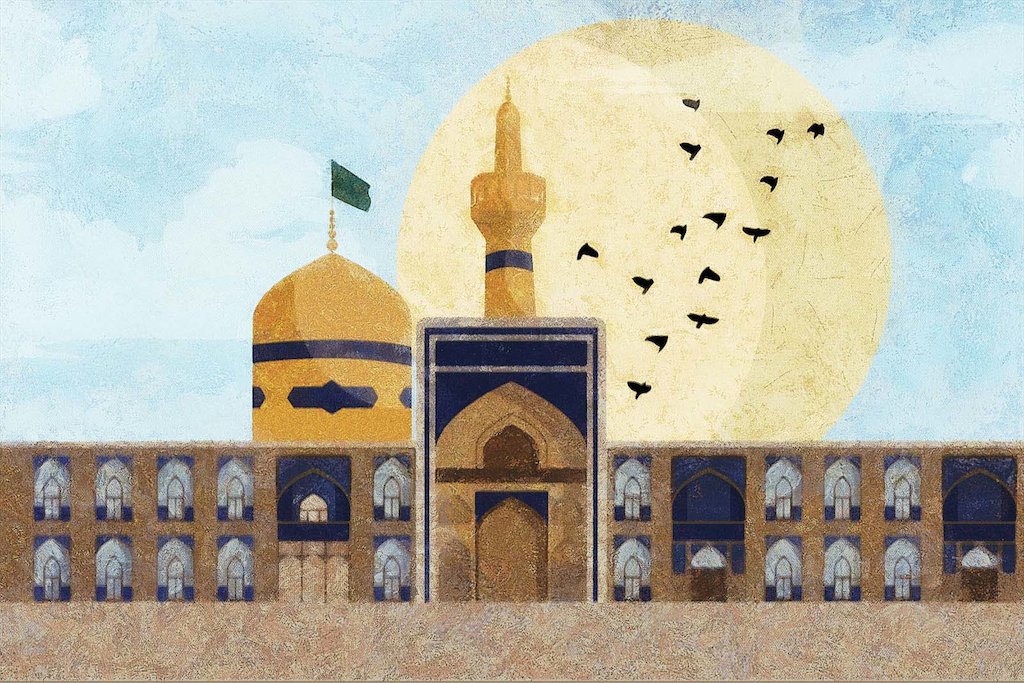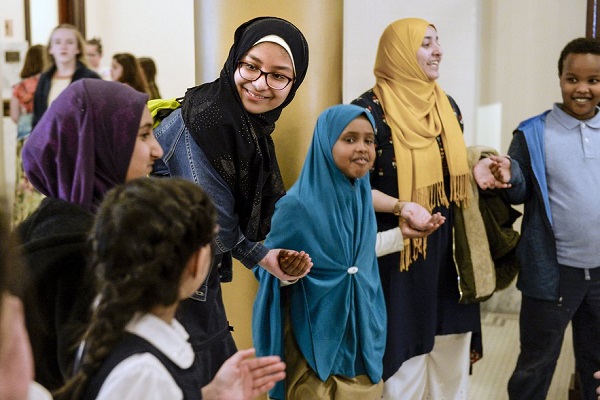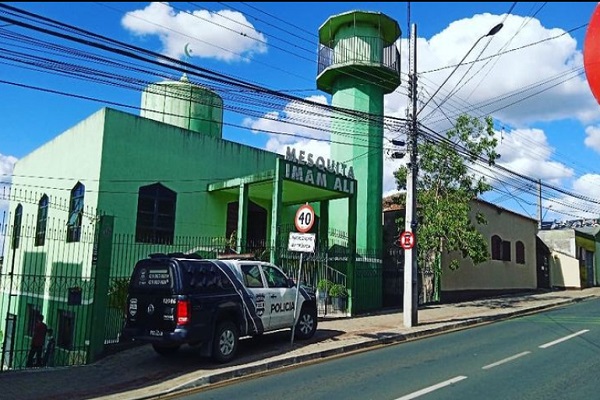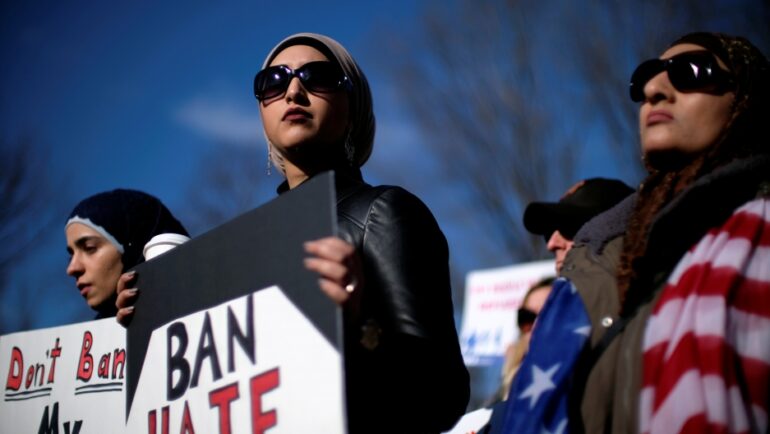According to rahyafte (the missionaries and converts website):
Khabbāb b. Aratt (Arabic: خَبّاب بن أرَتّ) was a companion to the Prophet (s) and Imam Ali (a) and one of the first Muslims. Polytheists of Mecca tortured him to make him renounce Islam; but he resisted. He immigrated from Mecca to Medina and participated in all the battles during the Prophet’s time. Later, he settled in Kufa and passed away in 37/657. He has narrated 32 hadiths from the Prophet (s).
Birth
Based on most historical accounts that he passed away in 37/657 at the age of 73, he must have been born 17 years after ‘Am al-Fil i.e. 23 years before Bi’tha (587-8). He earned his living by smithery.
Lineage
There are various opinions about his lineage. Most of those who believed that he was an Arab, said that he was from Banu Tamim tribe. So his full name would be: Khabbab b. Aratt b. Jandalat b. Sa’d b. Khuzaymat b. Ka’b b. Sa’d b. Zayd Mant b. Tamim (some mentioned Khuwaylid instead of Jandala). Some believed that he was from Khuza’a tribe or was under protection treaty with Banu Zuhra. Some said that Khabbab was originally from Kaskar a region in Iraq.
His Father’s Name
It has been said that Aratt acquired his name from his stutter in Arabic (in Arabic Ratta (root of Aratt) means to stutter). Accordingly, some have said that he was from Nabateans or Aramean in Iraq or from Iranians who settled in Kaskar. Also, a narration from Imam Ali (a) that says he was the first Nabatean converted to Islam supports the opinion that he was an Iraqi.
Kunya
Khabbab’s kuniya was Abu ‘Abd Allah. It is said that the Prophet (s) named Kabbab’s son ‘Abd Allah and called Khabba Abu ‘Abd Allah. However, some believed that his Kunya was Abu Yahya or Abu Muhammad. But, Abu Yahya was the Kunya for another companion of the Prophet (s) with the same name (Khabbab) who was the servant of ‘Utbat b. Ghazwan and died in 19/640 during ‘Umar‘s caliphate (13-23/ 634-644).
Descendants
Khabbab had several children. His son, ‘Abd Allah, was a commander in Imam Ali’s army in the Battle of Nahrawan and was martyred by Khawarij.
His descendants lived in Kufa until the time of Ibn Hisham (d. 218/833)
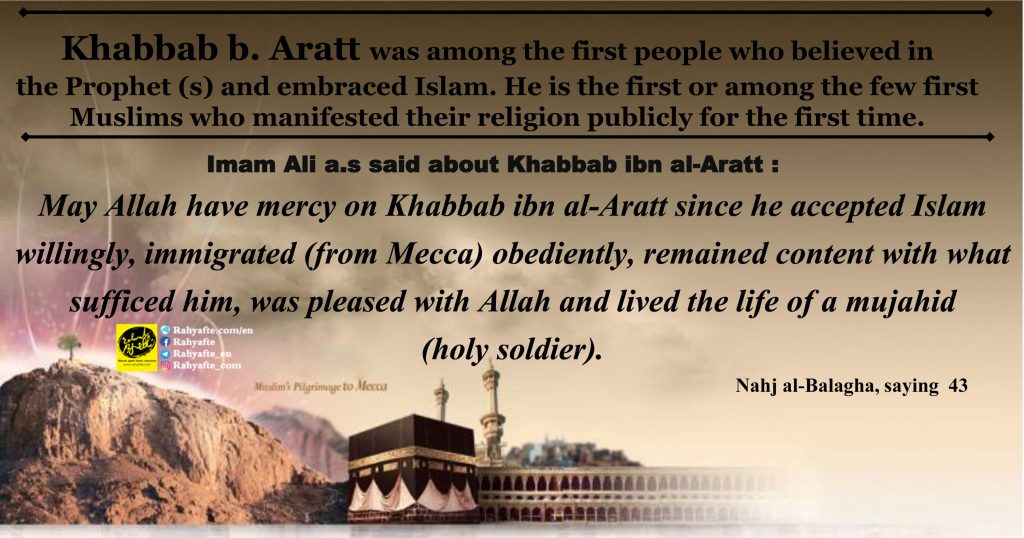
Conversion to Islam
Khabbab b. Aratt was among the first people who believed in the Prophet (s) and embraced Islam. Many historians said that he was the 6th person to accept Islam before the arrival of the Prophet (s) at the house of Arqam b. Abi l-Arqam. Others said that he was the 10th, 11th or 20th Muslim. He is the first or among the few first Muslims who manifested their religion publicly for the first time.
Before and after Hijra, he was counted among the poor Muslims. He says that when he embraced Islam he did not have even a dirham (penny). Muslims who had manifested their religion publicly and did not have protectors such as their tribes, were tortured brutally. Khabbab was one of these poor Muslims who were tortured to renounce Islam. He was about 23 to 25 year old at that time. It has been narrated in al-Tafsir li l-Imam al-‘Askari (a) (exegesis attributed to Imam al-Hasan al-‘Askari (a)) that a miracle happened to him, while he was chained up and tortured by Polytheists.
Propagating Islam
In early years of emergence of Islam, he was involved in propagational activities for spreading Islam. He taught the Qur’an to Fatima bt. Khattab -‘Umar’s sister, who later caused ‘Umar to embrace Islam by reciting the Qur’an- and her husband, Sa’id b. Zayd. Khabbab accompanied the Prophet (s) and liked him very much. He participated in all the battles during the Prophet’s life including Badr, Uhud and Khandaq. According to a hadith, the Prophet (s) gave him the responsibility for keeping and distributing the spoils of Badr.
Narration of the Prophet’s Quotes
He narrated 32 hadiths from the Prophet (s). Shi’a and Sunni jurists have used his narrations for proving some jurisprudential laws. He also narrated that Ali (a)was the first person who embraced Islam while he had reached puberty.
Some people who narrated hadiths from him are:
- His son, ‘Abd Allah
- Masruq
- Abu Wa’il
- Abu Ma’mar
- Qays b. Abi Hazim
- ‘Alqamat b. Qays
- Abu Amama al-Bahili
In Medina and Kufa
Khabbab immigrated to Medina volitionally. He was poor person in Medina as he was in Mecca. It is said that he remembered God all the time. After immigration, he lives in Kulthum b. Hadm‘s house and Sa’d b. ‘Ubada‘s for a while. The Prophet (s) established the Bond of Brotherhood between him and Tamim (male servant of Khirash b. Simma) or Jabr b. ‘Atik.
Later, Khabbab moved to Kufa. It is said that he was among the first people who built their houses from brick. Also, it is said that ‘Uthman granted him a land (named Isbiniya/Isbina or according to another account Sa’nabi) in Iraq, as a fief. Nevertheless, Khabbab was worried at his deathbed that he might have received the reward of his good deeds and efforts in this world so that he would not receive any in the Hereafter.
Khabbab was a smith before Hijra and was a master at making sword to the extent that he was held up as a perfect example in this field. According to this fact and the point that Muslim needed weapons, due to various wars happened in early years of Islam, he must have been doing this job for a living.
Demise
Khabbab suffered a bad and chronic, skin disease. It was during this time that he was counted among “Bakka’in” (who cries very much) and “Nawwahin” (who mourns very much).
According to some sources, he was absent in the Battle of Siffin due to his sickness and in 37/657 when Imam Ali (a) left Kufa for the Battle of Siffin, he passed away and Imam (a) saw his grave on his way back from the battle.
But according to Muhammad b. ‘Amr al-Waqidi, he passed away in 37/657 after that Imam (a) had returned to Kufa from Siffin. Imam performed Salat al-Mayyiton his body and buried him. He passed away at the age of 73.
Khabbab was the first person who was buried out of Kufa near the city gate. It was a common custom to bury the dead in or next to the door of their houses. Khabbab was the first person who made a will to be buried out of Kufa (currently Najaf).
source: http://en.wikishia.net
DUA: Allah please accept this from us. You are All-Hearing and All-Knowing. You are The Most Forgiving.You are The Most Relenting and repeatedly Merciful. Allah grant us The Taufiq to read all the 5 prayers with sincerity.
(Taken from: To Be Earnest In Prayers By Amina Elahi)
■ Feel Free to Share the posts with your Friends…
■ You too can take part and help us in sharing the knowledge…
■ May ALLAH SWT reward you for conveying His Message To Mankind







